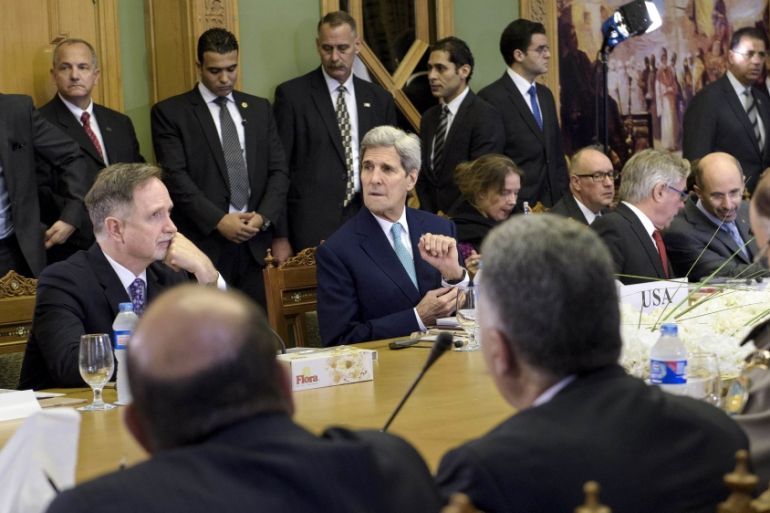US resumes strategic dialogue with Egypt
Formal security talks held after six-year gap as Kerry visits Cairo en route to the Gulf to discuss Iran nuclear deal.

The US has resumed formal security talks with Egypt that were last held six years ago and kept on hold until now amid the political unrest that swept the country in the wake of the Arab Spring.
John Kerry, US secretary of state, restarted the so-called strategic dialogue with Egyptian officials in Cairo on Sunday.
Keep reading
list of 4 itemsUS House approves aid package worth billions for Ukraine, Israel
Will India’s election be free and fair?
Togo approves constitutional reform changing how president is elected
The US and Egypt are returning to a “stronger base” in bilateral ties despite tensions and human rights concerns, he said after talks with his Egyptian counterpart Sameh Shoukry.
“Egypt remains vital … to engagement and stability in the region as a whole,” said Kerry, who held the first strategic dialogue between the two countries since 2009.
Heading off tonight for #Egypt, #Qatar, #Singapore, #Malaysia, #Vietnam. Important work ahead, starting w/US-Egypt Strategic Dialogue.
— John Kerry (@JohnKerry) August 1, 2015
The development comes two days after the US delivered eight F-16 fighter jets to Egypt as part of a military support package that the Obama administration is boosting to help Egypt counter an increasing terrorist threat.
The strategic dialogue was last held in 2009 and did not occur in subsequent years due to the Arab Spring and turmoil following the overthrow of Egypt’s authoritarian leader Hosni Mubarak in 2011.
US-Egyptian relations cooled after President Mohamed Morsi was removed in 2013 by the military amid protests against his rule.
Kerry said the administration was committed to working with Egypt to enhance its military capabilities as it confronts growing threats from extremists, particularly in the Sinai Peninsula.
That aid had been on hold until earlier this year due to human rights and democracy concerns in the wake of the coup against Morsi.
‘Robust training’
In talks with Shoukry, Kerry said the US would “continue to provide robust training to the Egyptian military, as the military seeks it and desires it, in an effort to build capacity, and also to meet the highest expectations of your military for its professionalism”.
He noted that in addition to the F-16s, the US had provided Egypt with Apache helicopters, attack boats, armoured vehicles and other weapons systems this year. More is on the way, he said.
At the same time, he acknowledged stress in the US-Egypt relationship over human rights and said the US would continue to press Egypt on the arrests of dissidents and journalists and mass trials.
![Shoukry said Egypt is committed to improving its human-rights conditions but argued that all countries have imperfect rights records [AP]](/wp-content/uploads/2015/08/c9954f679b5d407e9e6f0a4e2d5d5bb0_18.jpeg)
“Obviously, there has been a little bit of tension over certain issues,” he said at a joint news conference with Shoukry that was held shortly after a court in Cairo again postponed a verdict in the trial of three Al Jazeera journalists, whose arrests have led to widespread condemnation.
Shoukry said no journalists have been detained in Egypt for doing their jobs, only for terrorism and other offences, and he rejected criticism that detainees were being denied due process.
Related: Al Jazeera’s journalists on trial in Egypt
He said Egypt is committed to improving its human-rights conditions but noted that all countries, even mature democracies, have imperfect rights records.
Kerry made the case, though, that freedom of speech, assembly and peaceful political dissent must be allowed if Egypt is to successfully combat extremism, especially in the run-up to parliamentary elections to be held later this year.
Meeting with dissident
In advance of his trip, in Washington Kerry met Egyptian-American Mohammed Soltan, who has been sentenced to life in prison in Egypt for financing an anti-government sit-in and spreading “false news”.
One of thousands imprisoned after Morsi’s overthrow, Soltan had been on a hunger strike for more than a year before being freed in May after repeated US requests. He is the son of a prominent member of the now-outlawed Muslim Brotherhood.
|
|
Kerry was in Cairo on the first stop of a Middle East trip that is mainly aimed at assuaging Arab concerns over the nuclear deal between Iran and world powers.
After meeting Egyptian President Abdel-Fattah el-Sisi late on Sunday, he leaves for Qatar, where he will hold discussions with Gulf Arab foreign ministers on the Iran deal and its implications for the region.
On Iran, Kerry said he would be travelling to Doha to make the case to members of the Gulf Cooperation Council that the Iran nuclear agreement will make the Middle East more secure.
The Gulf Arab states have publicly welcomed the deal reached last month in Vienna but many have expressed private reservations.
“There can be absolutely no question that the Vienna plan, if fully implemented, will make Egypt and all the countries of this region safer than they otherwise would be or were,” he said.